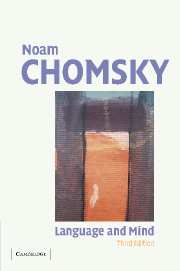Book contents
- Frontmatter
- Contents
- Preface to the third edition
- Preface to the second edition
- Preface to the first edition
- 1 Linguistic contributions to the study of mind: past
- 2 Linguistic contributions to the study of mind: present
- 3 Linguistic contributions to the study of mind: future
- 4 Form and meaning in natural languages
- 5 The formal nature of language
- 6 Linguistics and philosophy
- 7 Biolinguistics and the human capacity
- Index
5 - The formal nature of language
Published online by Cambridge University Press: 04 September 2012
- Frontmatter
- Contents
- Preface to the third edition
- Preface to the second edition
- Preface to the first edition
- 1 Linguistic contributions to the study of mind: past
- 2 Linguistic contributions to the study of mind: present
- 3 Linguistic contributions to the study of mind: future
- 4 Form and meaning in natural languages
- 5 The formal nature of language
- 6 Linguistics and philosophy
- 7 Biolinguistics and the human capacity
- Index
Summary
General properties of language
Many generations of productive scholarship notwithstanding, the questions to which this paper is addressed can receive only quite tentative answers. There are few languages for which descriptions in depth are available, and only selected aspects of language have been studied with sufficient care and success to provide support for conclusions of a general nature. Still, it is possible, with some degree of confidence, to outline certain properties and conditions that distinguish human languages among arbitrary systems of symbolic manipulation, communication, and self-expression.
Competence and performance
At the crudest level of description, we may say that a language associates sound and meaning in a particular way; to have command of a language is to be able, in principle, to understand what is said and to produce a signal with an intended semantic interpretation. But aside from much unclarity, there is also a serious ambiguity in this crude characterization of command of language. It is quite obvious that sentences have an intrinsic meaning determined by linguistic rule and that a person with command of a language has in some way internalized the system of rules that determine both the phonetic shape of the sentence and its intrinsic semantic content – that he has developed what we will refer to as a specific linguistic competence. However, it is equally clear that the actual observed use of language – actual performance – does not simply reflect the intrinsic sound–meaning connections established by the system of linguistic rules.
- Type
- Chapter
- Information
- Language and Mind , pp. 102 - 142Publisher: Cambridge University PressPrint publication year: 2006



